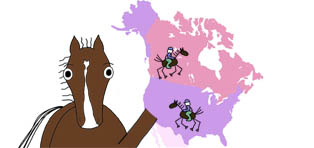 photo: Wendell T. Robie bought his first horse, a mustang from Nevada, for $20 of his own savings. With a little help from his grandfather, he broke, then rode, the horse all over Auburn to do errands for his father. He was 7 years old at the time.
photo: Wendell T. Robie bought his first horse, a mustang from Nevada, for $20 of his own savings. With a little help from his grandfather, he broke, then rode, the horse all over Auburn to do errands for his father. He was 7 years old at the time.Previously in this column, we shared the tale of the Pullman railcar at the Historic Passenger depot complex. Immediately, requests were voiced for the story of Wendell Towle Robie, in whose honor the US Bank gave the rolling hunk of metal to the Colfax community. This is, albeit brief, a summary of the man and his legacy to the Sierra.
A native of the Placer County seat, Auburn, born May 28, 1895, his ancestry dates back to New England colonists originating from Derbyshire, England. Henry Robie came to America and is a charter signer for the new town of Exeter, N.H. on July 4, 1639.
Wendell Robie’s great-grandfather, Bracket Towle, was an officer in the Revolutionary War.
Robie’s grandmother was the younger sister of the three Towle brothers who answered the call to the gold fields of California in the early 1850s. Ethan Allen Towle, the first to head west, reached Dutch Flat in 1851. He quickly realized there was a better fortune to be made in supplying the miners. Having had a lumber operation in Vermont, he knew the formula for success. He convinced his two brothers – George Washington Towle and Edwin Warrington Towle – to join him. After his sister May married John Henry Robie and had their child, Edwin Towle Robie, Towle invited them to move west and join the operation in 1870.
By 1889 their company became one of the largest lumber operations in California.
In 1887, J.H. Robie moved his family to Auburn in order to take charge of the Towle Bros. lumberyard. The primary reason for the transfer was to allow his son, E. T. Robie, to attend Sierra Normal College. He majored in business accounting and graduated in 1888. It was there “E.T.” met and later married Ina Stone in 1894. Shortly thereafter their first child, Wendell, was born.
When E.T. Robie became secretary of the Towle Brothers Company, he moved back to Towle. That’s where Wendell T. Robie began his schooling. The town was near Baxter and Alta but was subsequently removed for the construction of Interstate 80.
In 1900, George W. Towle, the only surviving brother, sold the sawmill business and retired. J.H. Robie, E.T. Robie and Lathrop Huntley purchased the Towle firm in Auburn and renamed it the Auburn Lumber Company. E.T. was named president. Under his direction, he and his associates expanded operations to Colfax, Truckee, Dixon, Woodland, and Tucson, Ariz.
In 1901, the company obtained a charter for a savings and loan association; it was the forerunner of Central Bank of California and Central California Building and Loan. Years later, the Robie firm was to become Heart Federal Savings.
In this rich environment and family history, Wendell T. Robie grew into self-confidence. He became president of the 1912 Placer High School graduating class. The assumption that he would follow the family tradition of taking over the business was a given. First college was on the menu. However, he was more interested in being a prankster than studying. The result was a failed attempt at the University of California, Berkeley almost ending in expulsion. Money and influence prevailed and after a short intermission and a bit of maturation, Robie transferred to the University of Arizona.
While at Arizona, Robie began his lifelong practice of getting involved in community. He also met and married his life companion, Inez Benzie. They had one son, John Henry.
The continued success of the family business through the years allowed him to pursue his avocations with vigor. The list of his dedications is long. It ranges from president of the Placer High Alumni Association to Lions Club, Auburn Volunteer Fire Department, Native Sons of the Golden West and E Clampus Vitus. Not just a joiner, he was a visionary and a doer. He formed ski clubs, along with other sporting groups. He was politically minded as well serving on several commissions and committees, often as chairman. Robie was a major player in not only bringing the Winter Olympics to Squaw but also seeing that Interstate 80 was completed to get spectators to the event.
One would be hard pressed to find disagreement that his greatest contribution, through vision and tenacity, is the construction and preservation of the Western States Trail. As founder of the WST Foundation in 1955 and the ride commonly called the Tevis Cup, Robie offered to the entire world his dream of a continuous trail, through the high summit at Squaw Pass and traversing the best scenic areas and maintain an absolute wilderness character. The 100-mile trail starts at Lake Tahoe, runs down the Foresthill Divide and ends in Auburn. The 56-year-old horse endurance contest and its younger two-legged runner version – the Western 100 – are internationally famous. The foundation protects and maintains the trail to this day.
Wendell Towle Robie literally worked until the day he died, October 31, 1984, at 89 years. He was wearing his Lions Club vest.

No comments:
Post a Comment